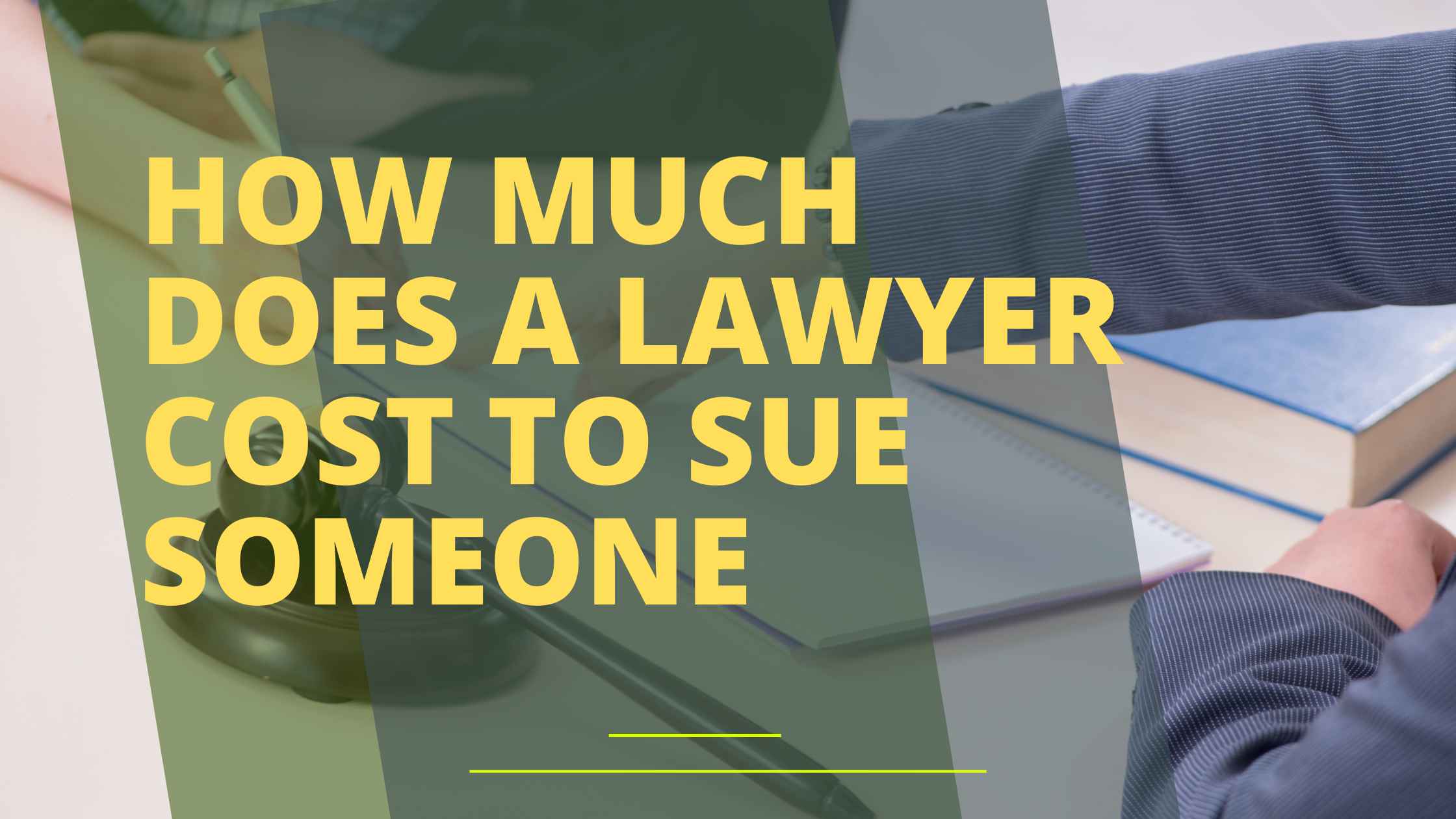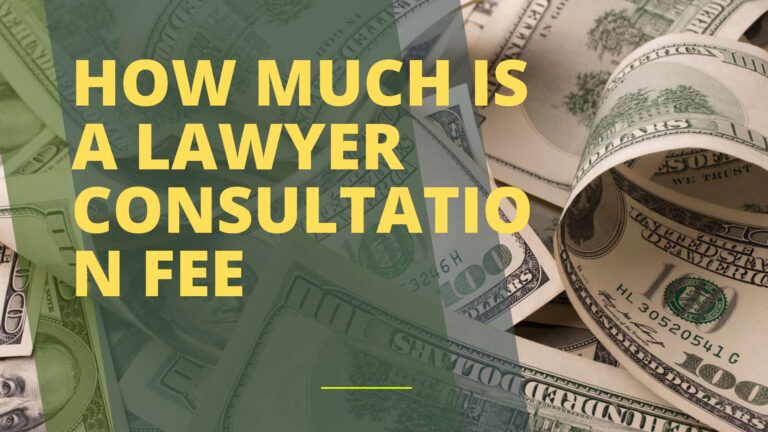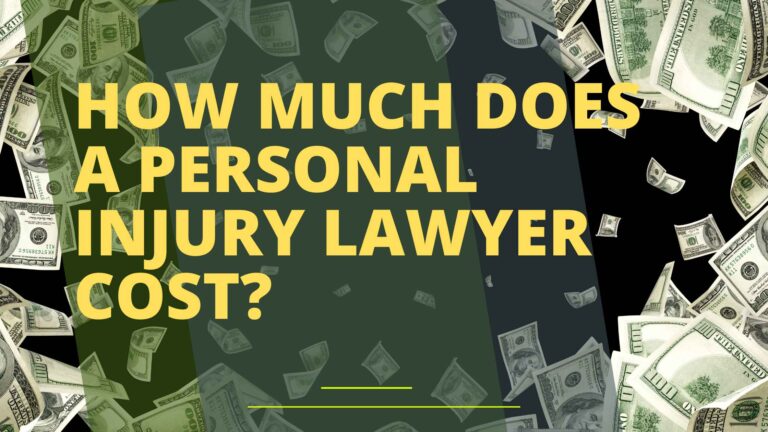How Much Does a Lawyer Cost to Sue Someone?

A lawyer’s cost to sue someone can vary and depends on several factors such as the complexity of the case, the lawyer’s experience, and the jurisdiction in which the case is being filed. However, on average, you can expect to pay anywhere from $5,000 to $30,000 or more in legal fees for a lawsuit.
Factors Affecting Legal Costs
Legal costs in a lawsuit can be influenced by several factors, such as the complexity of the case, the attorney’s experience, and the amount of time spent on the matter. The overall cost can vary significantly, making it crucial to discuss fees and potential expenses with a lawyer prior to pursuing legal action.
Factors Affecting Legal Costs
When it comes to suing someone, hiring a lawyer is an essential step to ensure your legal rights are protected. However, it’s important to consider the factors that can affect the cost of hiring a lawyer. Understanding these factors can help you plan and budget for the expenses involved in filing a lawsuit.
H3: Complexity of the Case
The complexity of a case plays a significant role in determining the cost of hiring a lawyer. Cases that are straightforward and simple tend to have lower legal costs, while complex cases requiring extensive research, analysis, and representation can be more expensive. Factors that contribute to the complexity of a case include the number of parties involved, the amount of evidence to be presented, and the intricacy of legal arguments to be made.
H3: Level of Experience of the Lawyer
The level of experience of the lawyer you choose to represent you can also impact the cost of your lawsuit. Lawyers with more experience typically charge higher fees due to their expertise and track record. While hiring an experienced lawyer can give you a greater chance of success, it’s important to find a balance between cost and expertise. Depending on the circumstances of your case, you may choose to work with an experienced lawyer or a less experienced lawyer who may offer more affordable rates.
H3: Geographical Location
The geographical location in which your case is filed can also affect the overall legal costs. Lawyers in urban areas or areas with a higher cost of living tend to charge higher fees compared to those in rural or less expensive areas. This difference in cost is often due to the higher overhead expenses faced by lawyers in urban areas, such as office rent and staff salaries. It’s important to consider the impact of geographical location on legal costs when choosing a lawyer and budgeting for your lawsuit.
In conclusion, several factors can influence the cost of hiring a lawyer to sue someone. The complexity of the case, the level of experience of the lawyer, and the geographical location are key factors to consider. By understanding these factors, you can make informed decisions when it comes to planning and budgeting for legal expenses.
Types Of Legal Fees
The cost of hiring a lawyer to sue someone can vary depending on the type of legal fees they charge. Legal fees typically fall into three main categories: hourly rate, flat fee, and contingency fee.
Hourly Rate
A common type of legal fee is the hourly rate, where the lawyer charges an hourly fee for their time spent working on the case. Hourly rates can vary significantly depending on the lawyer’s experience, location, and the complexity of the case. Lawyers often provide an estimate of the total hours required for the case, but actual hours may differ.
Flat Fee
Another type of legal fee is the flat fee, where the lawyer charges a fixed amount for handling an entire case or a specific legal service. Flat fees can be beneficial for clients as they provide cost predictability and transparency. However, it’s essential to clarify what services are included in the flat fee and whether additional fees may apply.
Contingency Fee
A contingency fee is a popular option for plaintiffs in personal injury and other civil cases. With a contingency fee, the lawyer only receives payment if the case is successful, typically taking a percentage of the settlement or court award. This fee structure can be attractive for clients who may not be able to afford upfront legal costs.
Average Costs Of Legal Services
When it comes to suing someone, legal costs can be a major concern for individuals seeking justice. Understanding the average costs of legal services can help you plan your budget accordingly. Lawyers typically charge clients based on either an hourly rate, a flat fee, or a contingency fee, depending on the type of case and the complexity involved.
Average Hourly Rates
Lawyers often charge clients based on the number of hours spent working on a case. Hourly rates can vary significantly depending on factors such as the lawyer’s experience, expertise, location, and the complexity of the legal matter. On average, you can expect to pay between $100 to $400 per hour for legal services. Keep in mind that senior or specialized lawyers may charge higher hourly rates, while those with less experience or handling less complex cases may charge a lower rate.
Average Flat Fees
Some lawyers may charge a flat fee for specific legal services, especially for simpler or routine cases. Flat fees are typically agreed upon at the beginning of the case and are not dependent on the number of hours worked. For instance, I have listed below some common legal services along with their average flat fees:
| Service | Average Flat Fee |
|---|---|
| Filing Small Claims | $150 – $500 |
| Drafting a Will | $300 – $800 |
| Simple Real Estate Closing | $1,000 – $2,500 |
| Uncontested Divorce | $1,500 – $4,000 |
Average Contingency Fees
In certain cases, lawyers may work on a contingency fee basis, where their payment is contingent on the outcome of the case. Typically, contingency fees are common in personal injury or accident cases, where lawyers agree to take a percentage of the final settlement or court award. The average contingency fee can range from 25% to 40% of the final amount awarded.
It’s important to note that the costs mentioned above are average estimates and can vary depending on various factors. For accurate pricing, it’s recommended to discuss your specific case with a lawyer and obtain a personalized cost estimate.
Additional Costs
Suing someone involves more than just hiring a lawyer. There are several additional costs that you should be aware of. These costs can vary depending on the complexity of your case, the duration of the lawsuit, and other factors. In this section, we will explore the three main additional costs that you may incur when suing someone: court filing fees, expert witness fees, and travel and administrative costs.
Court Filing Fees
Court filing fees are the fees you are required to pay when you file a lawsuit. These fees cover the administrative costs associated with processing and maintaining your case in the court system. The amount of court filing fees can vary depending on the jurisdiction and the type of case you are filing. It’s important to note that court filing fees are usually non-refundable, regardless of the outcome of your lawsuit.
Expert Witness Fees
Expert witnesses can play a crucial role in strengthening your case. An expert witness is a professional who has specialized knowledge or experience in a particular field relevant to your lawsuit. They can provide an unbiased opinion or testify on your behalf. However, hiring an expert witness can be costly. Expert witness fees can vary depending on the qualifications and expertise of the witness, as well as the time they spend preparing for and testifying in court. These fees can add a significant amount to your overall legal expenses.
Travel And Administrative Costs
When suing someone, you may incur additional costs related to travel and administrative tasks. This can include travel expenses for meetings, court appearances, or depositions. If your case involves witnesses or evidence in different locations, travel costs can quickly add up. Additionally, there may be administrative costs for document preparation, copying, and courier services. It’s important to keep these expenses in mind when budgeting for your lawsuit.
Overall, the costs associated with suing someone are not limited to just the lawyer’s fees. Court filing fees, expert witness fees, and travel and administrative costs are important factors to consider when determining the total cost of your lawsuit. Being aware of these additional costs can help you plan and budget accordingly as you seek justice in your legal case.
Ways To Manage Legal Costs
When considering legal action, it’s crucial to be aware of the associated costs. Managing legal expenses is a key aspect of suing someone, and there are several effective ways to do so. By implementing these strategies, you can navigate the financial aspects of pursuing legal action while also obtaining the necessary legal support.
Getting Multiple Quotes
Seeking multiple quotes from different lawyers or law firms is a prudent way to manage legal costs. When you compare quotes, you gain insights into the range of fees and can select an option that aligns with your budget.
Negotiating Payment Terms
Negotiating payment terms with your chosen lawyer can also be beneficial. Many legal professionals are open to discussing flexible payment arrangements, which could include installment plans or alternative fee structures.
Using Legal Aid Or Pro Bono Services
For individuals with limited financial resources, accessing legal aid or pro bono services can help to alleviate the financial burden of pursuing legal action. There are organizations and law firms that offer free or reduced-cost legal assistance to those in need.
Conclusion
So, how much does it cost to sue someone? Remember, legal fees vary based on various factors such as the complexity of the case, geographic location, and the attorney’s experience. Ultimately, it’s crucial to weigh the potential benefits against the financial investment when considering a lawsuit.
Always consult with a legal professional for accurate cost estimations.
Gabrielle Casewell, a seasoned legal advocate with an indomitable spirit, navigates the intricacies of law with finesse. Specializing in civil rights and corporate litigation, she combines sharp intellect with unwavering ethics. Casewell's dedication to justice extends beyond courtrooms, shaping her into a beacon for those seeking legal recourse. Her tenacity and compassion redefine the narrative of legal prowess.






